中考专项复习---情态动词课件(共16张PPT)
文档属性
| 名称 | 中考专项复习---情态动词课件(共16张PPT) |
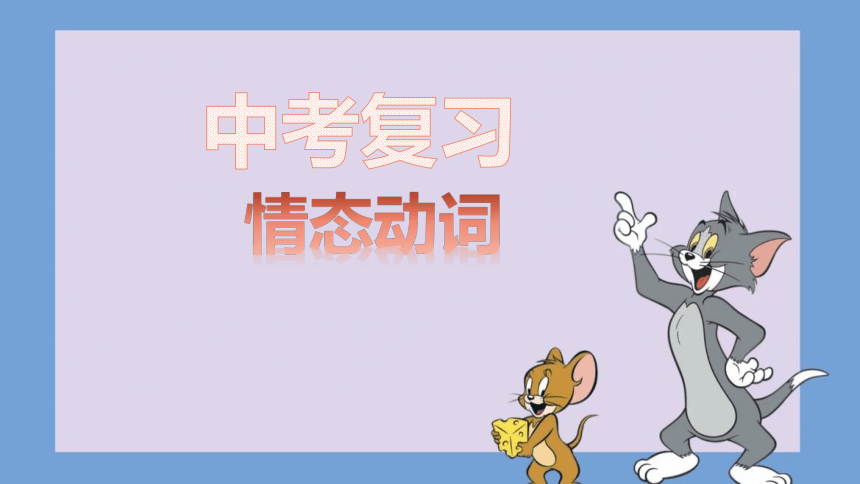
|
|
| 格式 | zip | ||
| 文件大小 | 180.6KB | ||
| 资源类型 | 教案 | ||
| 版本资源 | 通用版 | ||
| 科目 | 英语 | ||
| 更新时间 | 2022-08-16 00:00:00 | ||
图片预览

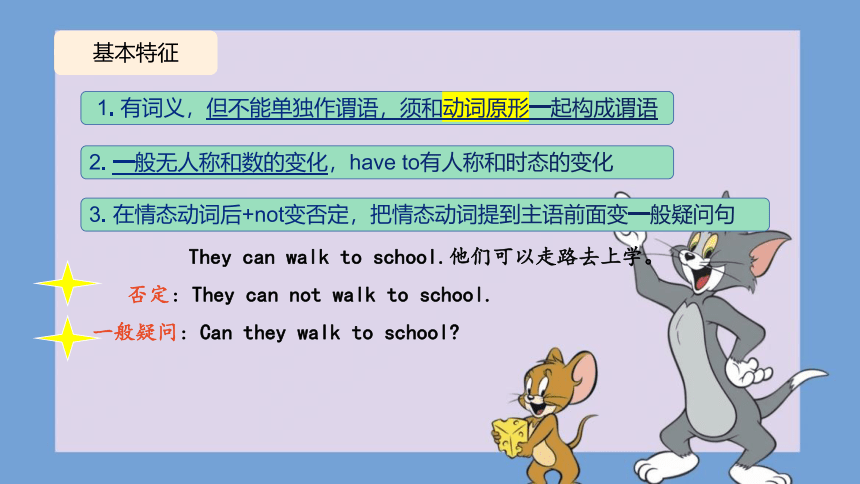
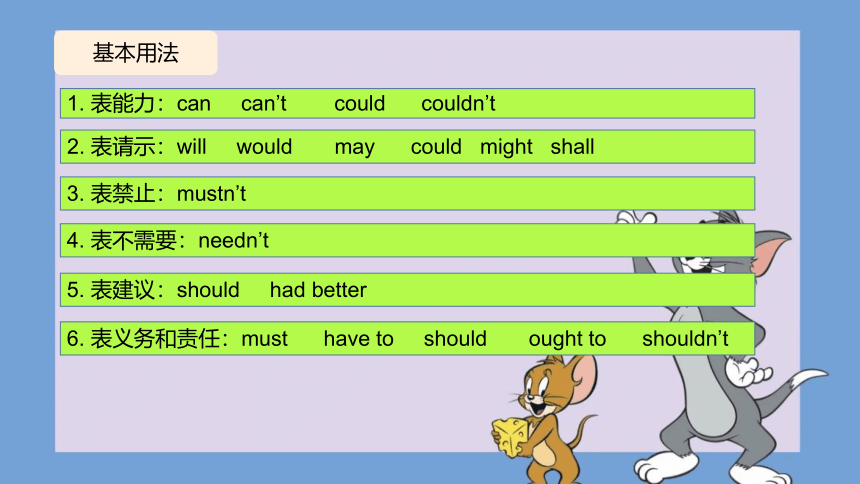
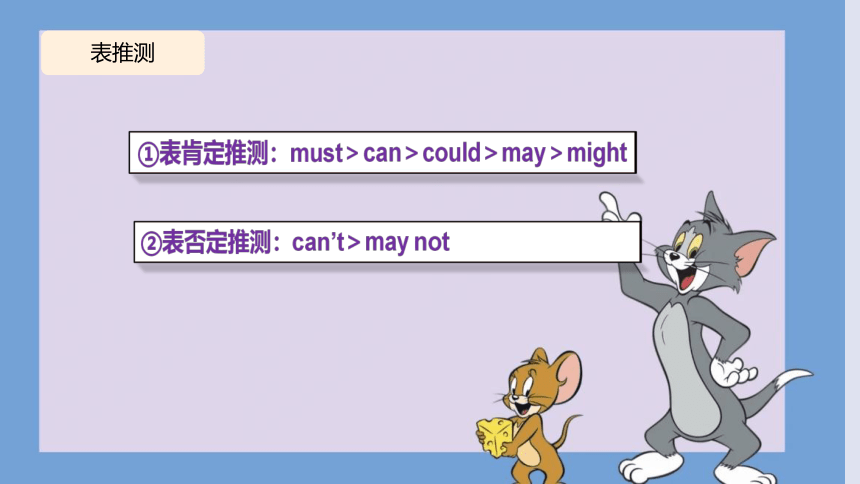
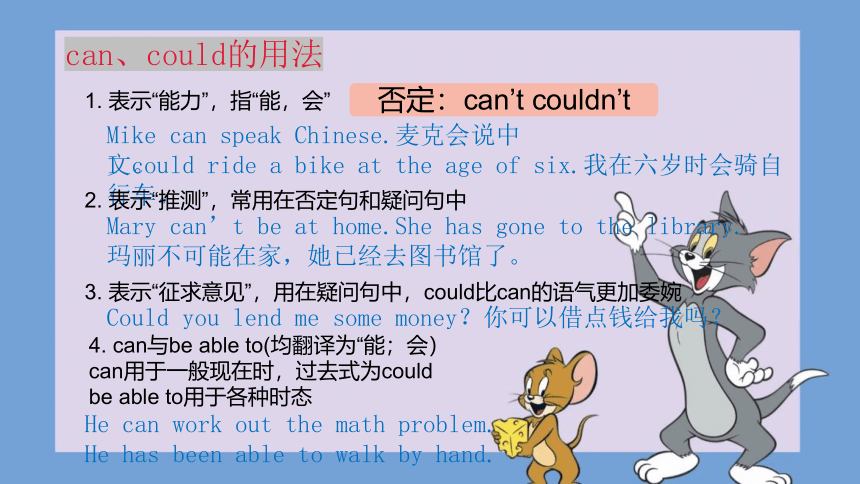
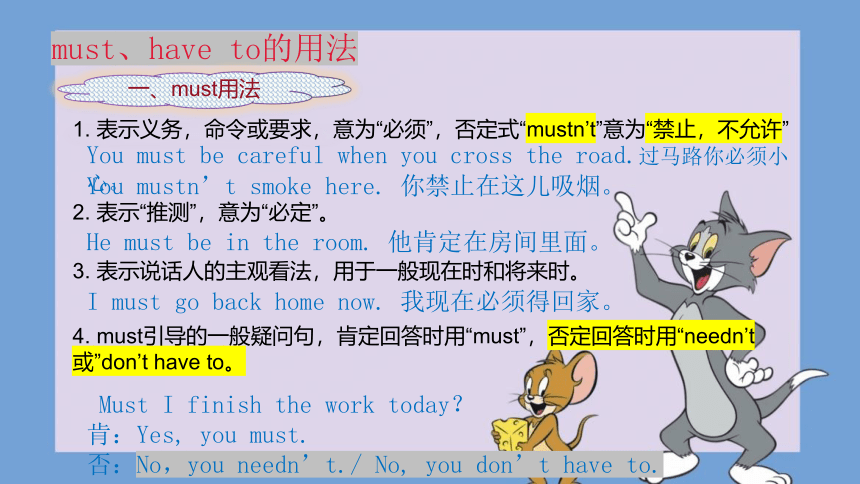
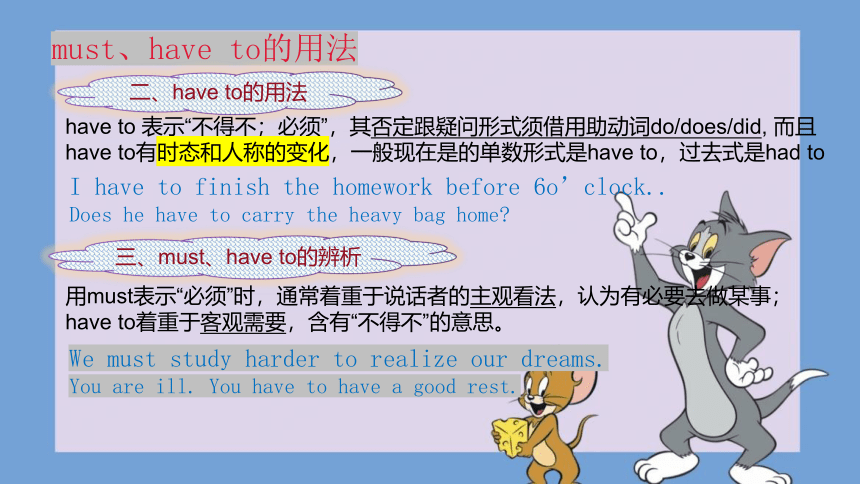
文档简介
(共16张PPT)
中考复习
情态动词
基本特征
1. 有词义,但不能单独作谓语,须和动词原形一起构成谓语
2. 一般无人称和数的变化,have to有人称和时态的变化
3. 在情态动词后+not变否定,把情态动词提到主语前面变一般疑问句
They can walk to school.他们可以走路去上学。
否定:They can not walk to school.
一般疑问:Can they walk to school
基本用法
1. 表能力:can can’t could couldn’t
2. 表请示:will would may could might shall
3. 表禁止:mustn’t
4. 表不需要:needn’t
5. 表建议:should had better
6. 表义务和责任:must have to should ought to shouldn’t
表推测
②表否定推测:can’t>may not
①表肯定推测:must>can>could>may>might
can、could的用法
1. 表示“能力”,指“能,会”
否定:can’t couldn’t
Mike can speak Chinese.麦克会说中文。
I could ride a bike at the age of six.我在六岁时会骑自行车。
2. 表示“推测”,常用在否定句和疑问句中
Mary can’t be at home.She has gone to the library.
玛丽不可能在家,她已经去图书馆了。
3. 表示“征求意见”,用在疑问句中,could比can的语气更加委婉
Could you lend me some money?你可以借点钱给我吗?
4. can与be able to(均翻译为“能;会)
can用于一般现在时,过去式为could
be able to用于各种时态
He can work out the math problem.
He has been able to walk by hand.
must、have to的用法
一、must用法
1. 表示义务,命令或要求,意为“必须”,否定式“mustn’t”意为“禁止,不允许”
You must be careful when you cross the road.过马路你必须小心。
You mustn’t smoke here. 你禁止在这儿吸烟。
2. 表示“推测”,意为“必定”。
He must be in the room. 他肯定在房间里面。
3. 表示说话人的主观看法,用于一般现在时和将来时。
I must go back home now. 我现在必须得回家。
4. must引导的一般疑问句,肯定回答时用“must”,否定回答时用“needn’t或”don’t have to。
Must I finish the work today?
肯:Yes, you must.
否:No,you needn’t./ No, you don’t have to.
must、have to的用法
二、have to的用法
I have to finish the homework before 6o’clock..
Does he have to carry the heavy bag home
have to 表示“不得不;必须”,其否定跟疑问形式须借用助动词do/does/did, 而且have to有时态和人称的变化,一般现在是的单数形式是have to,过去式是had to
三、must、have to的辨析
用must表示“必须”时,通常着重于说话者的主观看法,认为有必要去做某事;have to着重于客观需要,含有“不得不”的意思。
We must study harder to realize our dreams.
You are ill. You have to have a good rest.
need的用法
1. need作为情态动词,一般用于疑问句,否定句,此时need没有人称变化,后接动词原形,意为“需要”
He needn’t do that again.他不需要那样做一次。
2. need作为情态动词,在回答need引导的一般疑问句时,肯定回答用must,否定回答用needn’t
Need I bring the homework today?
肯:Yes, you must.
否:No, you needn’t.
3. need可作为实义动词,用法跟其他实义动词一样,need to do sth.需要做某事。
I need to wash my clothes every day.
may、might的用法
--Might/May I go fishing now
--Yes, you may./ No, you mustn’t.
1. 表示许可,意为“可以”
might比may语气上更客气,更委婉。
在回答may和might引导的一般疑问时,肯定回答用Yes,...may./ Yes, of course./ certainly; 否定回答用No, ...can’t/mustn’t.
2. 表示可能性,意为“可能”,might的可能性比较小
May you succeed.祝你成功。
May you have a bright future.愿你有一个美好的未来。
You may/might be sick.你可能生病了。
3. 表示祝愿,(May +名词或代词+动词)
shall、should的用法
You shall do the way I told you.你应该像我给你说的那样做。
1. shall用于第二和第三人称,表示说话人的意愿,有“命令,警告,允诺”的意思,在一般疑问句,shall用来征求对方的意见或请求指示,多用于第一人称。
2. should表示“应该”,可用于所有人称
You should finish your homework on time.你应该按时完成作业。
Shall we have a walk after meal 我们饭后走走,好吗?
should do =ought to sth.
willl、would的用法
I won’t do it again. So tired.我不会在做这个了,太累了。
1. will表示“意愿 ,意志”,用于各个人称,在疑问句中用于第二人称,表示询问对方的意愿或者向对方提出请求,否定形式 will not=won’t
2. would是will的过去式,表示过去的“意志;意愿”,可用于各个人称,用于第二人称的疑问句时,还可以表示人的意愿,语气比will更加委婉
Would you like to see a film with me?你愿意和我一起去看电影吗 ?
Will you give me a hand 可以帮我一下吗?
will和would在疑问句中,表示请求建议,都是用于第二人称
could/would不仅可以作为“过去式”,还可以用于一般疑问句中,表示请求或者邀请
had better的用法
You had better sit here and wait for me.你最好坐在这里等我。
had better意思“最好是”缩写为’d better
肯定式:had better do sth.
否定式:had better not do sth.
You had better not speak now because they are sleeping.
你最好现在不要说话,因为他们在睡觉。
实战演练
( )1.Mr. Wang be in Nanjing now, he went to Beijing only this morning.
A. mustn't В. may not C. can't D. needn't
( )2.--Must I stay at home,Mum
--No, you .
A. needn't B. mustn't C. don't D. may not
( )3.-Can you go swimming with us this afternoon
-- Sorry, I can't. I take care of my little sister at home because my mother is ill
A. can B. may C. would D.have to
( ) 4. - -May I go to the cinema, Mum
--Certainly. But you be back by 11 о' clock.
A. can B. may C. must D. need
( ) 5.To make our city more beautiful, rubbish into the river.
A. needn't be thrown B. mustn't be thrown
C. can't throw D. may not throw
实战演练
( ) 6.-- Maу I go out to play basketball, Dad
--No, you .You must finish your homework first.
A. mustn't В. may not C. couldn't D.needn't
( ) 7.-Where is Jack, please
--He be in the reading room.
A. can В. need C. would D. have to
( ) 8.-Who is the man over there Is it Mr Li
--No, it be him. Mr Li is much taller.
A. musn't B. may no C. can't D.needn't
( )9.These books out of the reading room. You have to read them here.
A. can't take В. must be taken C. can take D.mustn't be taken
实战演练
( )10. I know your name
A. May B. Will C. Shall D. Must
( )11.You miss the lesson, though we have it on Thursday.
A. mustn’t; needn't B. needn't; mustn't
C. mustn't; mustn't D. needn't; needn't
( ) 12. This pen looks like mine, yet it isn't. whose it be
A. must B. need C. would D. can
( ) 13. What kinds of homes will we live in the future Nobody be sure, but scientists are working out new ideas now.
A. will B. may C. can D. must
( )14. you be happy!
A. Might B. Must C. Wish D. May
Thank you!
中考复习
情态动词
基本特征
1. 有词义,但不能单独作谓语,须和动词原形一起构成谓语
2. 一般无人称和数的变化,have to有人称和时态的变化
3. 在情态动词后+not变否定,把情态动词提到主语前面变一般疑问句
They can walk to school.他们可以走路去上学。
否定:They can not walk to school.
一般疑问:Can they walk to school
基本用法
1. 表能力:can can’t could couldn’t
2. 表请示:will would may could might shall
3. 表禁止:mustn’t
4. 表不需要:needn’t
5. 表建议:should had better
6. 表义务和责任:must have to should ought to shouldn’t
表推测
②表否定推测:can’t>may not
①表肯定推测:must>can>could>may>might
can、could的用法
1. 表示“能力”,指“能,会”
否定:can’t couldn’t
Mike can speak Chinese.麦克会说中文。
I could ride a bike at the age of six.我在六岁时会骑自行车。
2. 表示“推测”,常用在否定句和疑问句中
Mary can’t be at home.She has gone to the library.
玛丽不可能在家,她已经去图书馆了。
3. 表示“征求意见”,用在疑问句中,could比can的语气更加委婉
Could you lend me some money?你可以借点钱给我吗?
4. can与be able to(均翻译为“能;会)
can用于一般现在时,过去式为could
be able to用于各种时态
He can work out the math problem.
He has been able to walk by hand.
must、have to的用法
一、must用法
1. 表示义务,命令或要求,意为“必须”,否定式“mustn’t”意为“禁止,不允许”
You must be careful when you cross the road.过马路你必须小心。
You mustn’t smoke here. 你禁止在这儿吸烟。
2. 表示“推测”,意为“必定”。
He must be in the room. 他肯定在房间里面。
3. 表示说话人的主观看法,用于一般现在时和将来时。
I must go back home now. 我现在必须得回家。
4. must引导的一般疑问句,肯定回答时用“must”,否定回答时用“needn’t或”don’t have to。
Must I finish the work today?
肯:Yes, you must.
否:No,you needn’t./ No, you don’t have to.
must、have to的用法
二、have to的用法
I have to finish the homework before 6o’clock..
Does he have to carry the heavy bag home
have to 表示“不得不;必须”,其否定跟疑问形式须借用助动词do/does/did, 而且have to有时态和人称的变化,一般现在是的单数形式是have to,过去式是had to
三、must、have to的辨析
用must表示“必须”时,通常着重于说话者的主观看法,认为有必要去做某事;have to着重于客观需要,含有“不得不”的意思。
We must study harder to realize our dreams.
You are ill. You have to have a good rest.
need的用法
1. need作为情态动词,一般用于疑问句,否定句,此时need没有人称变化,后接动词原形,意为“需要”
He needn’t do that again.他不需要那样做一次。
2. need作为情态动词,在回答need引导的一般疑问句时,肯定回答用must,否定回答用needn’t
Need I bring the homework today?
肯:Yes, you must.
否:No, you needn’t.
3. need可作为实义动词,用法跟其他实义动词一样,need to do sth.需要做某事。
I need to wash my clothes every day.
may、might的用法
--Might/May I go fishing now
--Yes, you may./ No, you mustn’t.
1. 表示许可,意为“可以”
might比may语气上更客气,更委婉。
在回答may和might引导的一般疑问时,肯定回答用Yes,...may./ Yes, of course./ certainly; 否定回答用No, ...can’t/mustn’t.
2. 表示可能性,意为“可能”,might的可能性比较小
May you succeed.祝你成功。
May you have a bright future.愿你有一个美好的未来。
You may/might be sick.你可能生病了。
3. 表示祝愿,(May +名词或代词+动词)
shall、should的用法
You shall do the way I told you.你应该像我给你说的那样做。
1. shall用于第二和第三人称,表示说话人的意愿,有“命令,警告,允诺”的意思,在一般疑问句,shall用来征求对方的意见或请求指示,多用于第一人称。
2. should表示“应该”,可用于所有人称
You should finish your homework on time.你应该按时完成作业。
Shall we have a walk after meal 我们饭后走走,好吗?
should do =ought to sth.
willl、would的用法
I won’t do it again. So tired.我不会在做这个了,太累了。
1. will表示“意愿 ,意志”,用于各个人称,在疑问句中用于第二人称,表示询问对方的意愿或者向对方提出请求,否定形式 will not=won’t
2. would是will的过去式,表示过去的“意志;意愿”,可用于各个人称,用于第二人称的疑问句时,还可以表示人的意愿,语气比will更加委婉
Would you like to see a film with me?你愿意和我一起去看电影吗 ?
Will you give me a hand 可以帮我一下吗?
will和would在疑问句中,表示请求建议,都是用于第二人称
could/would不仅可以作为“过去式”,还可以用于一般疑问句中,表示请求或者邀请
had better的用法
You had better sit here and wait for me.你最好坐在这里等我。
had better意思“最好是”缩写为’d better
肯定式:had better do sth.
否定式:had better not do sth.
You had better not speak now because they are sleeping.
你最好现在不要说话,因为他们在睡觉。
实战演练
( )1.Mr. Wang be in Nanjing now, he went to Beijing only this morning.
A. mustn't В. may not C. can't D. needn't
( )2.--Must I stay at home,Mum
--No, you .
A. needn't B. mustn't C. don't D. may not
( )3.-Can you go swimming with us this afternoon
-- Sorry, I can't. I take care of my little sister at home because my mother is ill
A. can B. may C. would D.have to
( ) 4. - -May I go to the cinema, Mum
--Certainly. But you be back by 11 о' clock.
A. can B. may C. must D. need
( ) 5.To make our city more beautiful, rubbish into the river.
A. needn't be thrown B. mustn't be thrown
C. can't throw D. may not throw
实战演练
( ) 6.-- Maу I go out to play basketball, Dad
--No, you .You must finish your homework first.
A. mustn't В. may not C. couldn't D.needn't
( ) 7.-Where is Jack, please
--He be in the reading room.
A. can В. need C. would D. have to
( ) 8.-Who is the man over there Is it Mr Li
--No, it be him. Mr Li is much taller.
A. musn't B. may no C. can't D.needn't
( )9.These books out of the reading room. You have to read them here.
A. can't take В. must be taken C. can take D.mustn't be taken
实战演练
( )10. I know your name
A. May B. Will C. Shall D. Must
( )11.You miss the lesson, though we have it on Thursday.
A. mustn’t; needn't B. needn't; mustn't
C. mustn't; mustn't D. needn't; needn't
( ) 12. This pen looks like mine, yet it isn't. whose it be
A. must B. need C. would D. can
( ) 13. What kinds of homes will we live in the future Nobody be sure, but scientists are working out new ideas now.
A. will B. may C. can D. must
( )14. you be happy!
A. Might B. Must C. Wish D. May
Thank you!
同课章节目录
- 词法
- 名词
- 动词和动词短语
- 动词语态
- 动词时态
- 助动词和情态动词
- 非谓语动词
- 冠词
- 代词
- 数词和量词
- 形容词副词及其比较等级
- 介词和介词短语
- 连词和感叹词
- 构词法
- 相似、相近词比较
- 句法
- 陈述句
- 一般疑问句和否定疑问句
- 特殊疑问句及选择疑问句
- 反意疑问句
- 存在句(There be句型)
- 宾语从句
- 定语从句
- 状语从句
- 主谓一致问题
- 简单句
- 并列句
- 复合句
- 主谓一致
- 主、表语从句
- 名词性从句
- 直接引语和间接引语
- 虚拟语气
- 感叹句
- 强调句
- 倒装句
- 祈使句
- 句子的成分
- 句子的分类
- 题型专区
- 单项选择部分
- 易错题
- 完形填空
- 阅读理解
- 词汇练习
- 听说训练
- 句型转换
- 补全对话
- 短文改错
- 翻译
- 书面表达
- 任务型阅读
- 语法填空
- 其他资料
